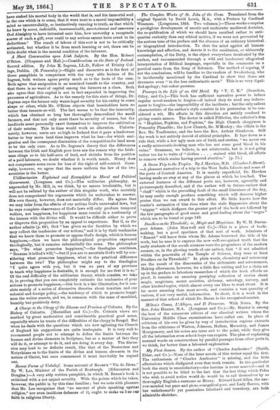Utilitarianism Explained and Exemplified in Moral and Political Government. (Longman
and Co.)—The utilitarian philosophy, as expounded by Mr. Mill, is, we think, by no means irrefutable, but it will not be refuted by the author of this singular work, who certainly does not comprehend the arguments which he undertakes to answer. His own theory, however, does not materially differ. He agrees that we may infer from the effects of our actions God's unrevealed laws, but he says complete observance of God's laws will only produce temporal welfare, not happiness, for happiness must consist in a conformity of the human with the divine will. It would be difficult either to prove or disprove this proposition by an appeal to experience. But if, as the author admits (p. 68), God "has given us the faculties by which we may collect the tendencies of our actions," and it is by their tendencies that we know them to promote or oppose God's design, which is human happiness,—then we have the philosophical proposition expressed theologically, but it remains substantially the same. The philosopher says, "Do what promotes happiness,"—the theologian continues, "Because it is God's will,"—but if you are to ascertain God's will by con- sidering what promotes happiness, what is the practical difference between the two? The philosopher might say to the theologian "I quite agree with you, but it was no part of my province to teach why happiness is desirable, it is enough for me that it is so." Of the real difficulty of the utilitarian theory, which consists, we take it, in proving that you can completely estimate the tendencies of your actions to promote happiness,—this book is a fair illustration, for it con- sists mainly of a series of discursive theories about taxation and our colonial and foreign policy,—the tendency of which to promote happi- ness the writer asserts, and we, in common with the mass of mankind, humbly but positively deny.
































 Previous page
Previous page